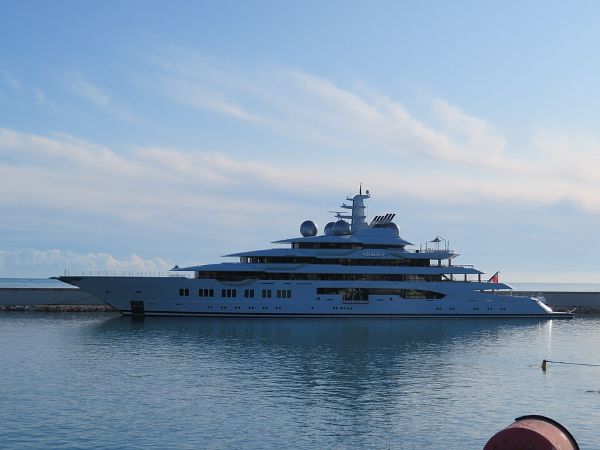A luxury superyacht seized by the U.S. over its suspected ownership by a sanctioned Russian oligarch, will be auctioned next month, according to the official auction site. Bidders must deposit $10 million in escrow and possess a minimum net worth of $500 million to enter the auction.
But wealthy investors considering the purchase of the $325 million Amadea superyacht face an unexpected challenge: winning the auction may be the easiest part of the deal. The vessel carries a legal burden that could leave new owners stuck in U.S. ports or entangled in lawsuits across multiple continents.
The U.S. Department of Justice seized the 106-meter Amadea in Fiji in 2022 as part of sanctions against Russian businesses following the invasion of Ukraine. While U.S. courts issue clear ownership documents, their jurisdiction is limited to U.S. territorial waters. “You’re buying a floating lawsuit,” warns one maritime law attorney.
Outside U.S. waters, the legal situation changes drastically. Turkey, the UAE, the Maldives and many other countries do not automatically recognise U.S.-seized assets, allowing original Russian owners to challenge ownership through local courts. Turkey’s judicial system has already shown receptiveness to Russian property claims, leveraging Ankara’s ongoing diplomatic ties with Moscow.
Market precedents confirm risks
The case of the Alfa Nero, an 81-meter superyacht seized from another sanctioned Russian billionaire, Andrey Guryev, illustrates the scale of the problem. In June 2023, Eric Schmidt, former Google CEO, attempted to acquire it for $67 million. Initially, the deal seemed straightforward until Guryev’s daughter, the sole beneficiary of a trust that holds ownership of the Alfa Nero, initiated lawsuits in multiple jurisdictions. Ultimately, Eric Schmidt and several other bidders walked away from the deal due to legal entanglements.
In July 2024, Antigua’s government finally sold Alfa Nero to an anonymous buyer for just $40 million, a fraction of its original estimated value. However, the superyacht remains at the centre of multiple legal battles, with the legality of the seizure and sale being challenged in courts worldwide. Antigua’s prime minister and members of his family have come under scrutiny, accused of misappropriating funds from the yacht’s sale. The title of the superyacht is also being contested, potentially exposing it to seizure in various jurisdictions.
Amadea’s operational costs exacerbate issues
Monthly expenses for Amadea reach $600,000 for maintenance plus $140,000 for insurance—figures that exclude major repairs, which can easily exceed seven figures. Insurance markets are increasingly cautious about vessels with disputed ownership. Coverage becomes expensive, difficult to obtain, or entirely unavailable in some jurisdictions where legal issues persist.
The yacht’s high-profile status as a symbol of oligarchic excess creates additional reputational risks. In the media, Amadea is consistently portrayed as an emblem of oligarchic extravagance, making it a potential PR issue for charter clients seeking privacy. If a seizure occurs during active chartering, stranded crew and cancelled bookings could lead to cascading contractual penalties.
Religious restrictions for Middle Eastern buyers
Buyers from Middle Eastern countries face additional hurdles beyond standard legal risks. Islamic jurisprudence views arbitrary confiscation and resale of property as ghasb (unlawful appropriation), regardless of foreign court rulings. This religious aspect adds moral and social risks to commercial considerations.
In Persian Gulf business circles, where Islamic principles significantly influence commercial relationships, owning assets of questionable origin can damage critical business ties. Financial institutions, partners, and close associates may view such acquisitions as religiously problematic, impacting broader business operations.
Amadea’s limited mobility reduces value
The Amadea auction highlights broader issues in asset markets during sanctions periods. Traditional maritime law assumes jurisdictional cooperation, which current geopolitical tensions have undermined. Buyers are essentially acquiring a vessel that functions normally only within specific geographic boundaries—a fundamental limitation for an asset designed for global mobility.
Charter market dynamics further complicate ownership calculations. International yacht charters depend on destination flexibility, but Amadea’s legal status restricts access to numerous key markets. Resale prospects appear equally limited—future buyers will face similar legal uncertainty, suggesting an irreversible decline in market value.
Market test
The auction’s outcome will serve as an indicator of market interest in problematic assets. Low bids will show that legal risks render such purchases unviable. High bids will suggest buyers view the challenges as manageable or that pricing adequately reflects the risk premium.
The Amadea auction will set a precedent for valuing assets with ongoing legal uncertainty in a fragmented international legal environment.

